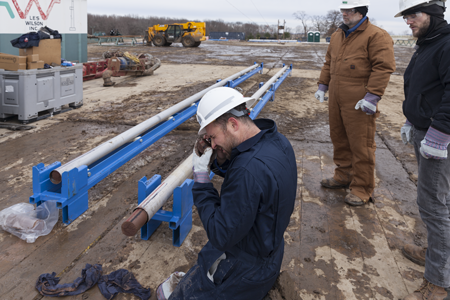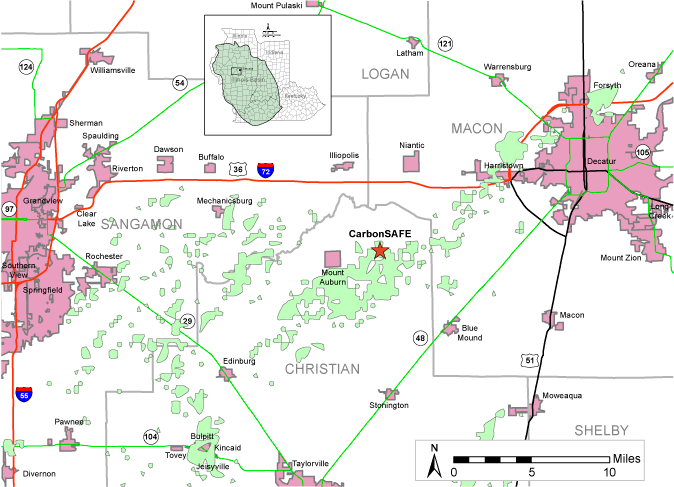CarbonSAFE Illinois Macon County
Objective
 The objective of this project is to establish the feasibility of developing a commercial-scale geological storage complex in Macon County, IL, that could store 50 million tonnes or more of industrially sourced CO2. This project involves the initial characterization of a commercial-scale site within the Mt. Simon storage complex and developing datasets of formation parameters needed to evaluate the suitability of the potential site. A stratigraphic test well will be drilled in the Forsyth Oil Field to step out from nearby existing storage sites, to establish the potential capacity for this complex. Static and dynamic modeling will be used to examine the performance of the site and evaluate it for long-term security. The models will be used to improve estimates of storage capacity. The data and models will also be used to validate the US Department of Energy’s National Energy Technology Laboratory National Risk Assessment Partnership (NRAP) Toolkit, which is being developed to better understand risks of CCS at the commercial scale. A detailed plan will be prepared for further characterization requirements to reduce subsurface uncertainty at this site and for continued work toward commercializing storage complexes. In addition, social attitudes toward the project will be monitored; permitting requirements, legal issues, and contractual issues will be outlined; source networks will be strengthened; and project partners will be assembled.
The objective of this project is to establish the feasibility of developing a commercial-scale geological storage complex in Macon County, IL, that could store 50 million tonnes or more of industrially sourced CO2. This project involves the initial characterization of a commercial-scale site within the Mt. Simon storage complex and developing datasets of formation parameters needed to evaluate the suitability of the potential site. A stratigraphic test well will be drilled in the Forsyth Oil Field to step out from nearby existing storage sites, to establish the potential capacity for this complex. Static and dynamic modeling will be used to examine the performance of the site and evaluate it for long-term security. The models will be used to improve estimates of storage capacity. The data and models will also be used to validate the US Department of Energy’s National Energy Technology Laboratory National Risk Assessment Partnership (NRAP) Toolkit, which is being developed to better understand risks of CCS at the commercial scale. A detailed plan will be prepared for further characterization requirements to reduce subsurface uncertainty at this site and for continued work toward commercializing storage complexes. In addition, social attitudes toward the project will be monitored; permitting requirements, legal issues, and contractual issues will be outlined; source networks will be strengthened; and project partners will be assembled.
Project Overview
The feasibility of a commercial-scale CCS site will be established by cataloging and analyzing all relevant existing data. Any additional subsurface data essential for characterizing a storage complex, including geological, geophysical, geochemical, geomechanical, and hydrogeological data, will be obtained as needed. Data or knowledge gaps will be identified to help design future characterization efforts. To address data gaps, a stratigraphic test well will be drilled to gain new knowledge of the geological characteristics of the Mt. Simon storage complex regionally, to help reduce uncertainty about its capacity to store more than 50 million tonnes of CO2. This work will also address improving storage resource capacity estimates to the industry-required accuracy of ±30% with the Carbon Storage Screening Tool and reservoir modeling. Existing and new well data will be incorporated into static and dynamic geologic models of the storage complex to assess injection and storage performance and long-term containment. These data and model results will be compared and used to validate complimentary NRAP tools designed to reduce risk and uncertainty associated with commercial-scale CCS.
The modeling will also be used to initially evaluate potential methods of improving reservoir efficiency. A technical and non-technical risk assessment will be conducted to identify steps to reduce subsurface uncertainty and non-technical issues that will need to be addressed by future work. The risk assessment, new well data, and results of characterization and modeling will be used to develop a detailed characterization plan to outline data acquisition requirements, tests and analyses, modeling and simulation processes needed to reduce subsurface uncertainty, and achieve certification and permitting for commercial storage. The studies and outcomes of this phase will be part of the project’s knowledge sharing activities and will contribute to developing best practice manuals for deploying commercial-scale CCS.
An outreach program and Advisory Board, which will consist of community, industry, and business leaders, will be maintained during the project, and they will evolve based on project needs. The project will identify all applicable regulations to perform storage development and outline procedures needed to obtain Underground Injection Control permits.

